A little while ago FIFA released their shortlist of the best ten coaches in women’s football for 2016 and our writers – along with many fans and pundits – were collectively left to scratch their heads, struggling with too many on the list who didn’t belong and too many who’d missed out. As we’d put our heads together to pay tribute to our best 50 players of the year it surely only made sense to do likewise with their coaches? So that’s what we did!
Only we didn’t do 50, but we’re far too cool to have only done a list of ten, so here’s our list of our Top Eleven Coaches of 2016 – but as coaching can be incredibly different across domestic and national teams, they’re not rated from 1-11 but rather just listed in alphabetical order.
Joseba Agirre – Athletic Club
Bilbao stalwart, Joseba Agirre that will be familiar to those with a keen interest in Basque football, the midfielder having spent ten of his fifteen year playing career in the region. His reign with Athletic women has been a strong one, guiding the team to their first Spanish title (and first in the Primera División) for nine years during the 2015-16 season
Having been there or there abouts since the days of the Superliga, Athletic have been one of the quiet stars of Spanish women’s football since the turn of the century but have struggled to topple Barcelona in recent years, so often the bridesmaids to their proverbial bride. But after dropping to third for the first time in four years at the end of the 2014-15 season, the Basque team came back full throttle for the following season. With Agirre at the helm the humble club from Northern Spain put an end to Barcelona’s dominance and the four-time champions were forced to settle for second place.
If you were to go through the current Spain squad you’d be hard pressed to find a Bilbao player 33 year-old Erika Vázquez the only exception, her most recent cap against Ireland in April (although former Bilbao, now PSG, defender Irene Paredes could be included). The Spain squad is however jam-packed with players from Barcelona and (this season’s title chasers) Atlético Madrid, neither Agirre nor Athletic Club can boast that level of international experience of quality of crop.
With that in mind, the continued achievements of Bilbao must not be written off, the team play with conviction and style, not quite as impressive in front of goal as the Catalonians – managing a mere 75 goals in their title winning season, to Barca’s 98. But Agirre’s Club have consistently impressed, and their triumphs over the 2015-16 are well worthy of note.
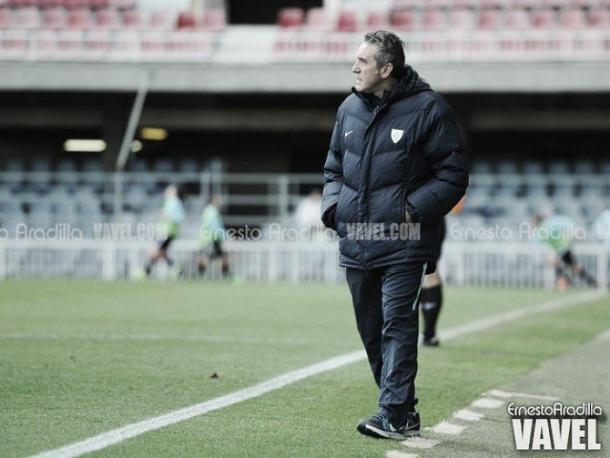
Stellan Carlsson – Piteå IF
The only coach on our list to not either win a league title or lead a national team through a major tournament, may outside of Sweden may be unfamiliar with the Damallsvenskan Coach of the Year, Stellan Carlsson. Although his fellow Dam coach, Martin Sjögren also features, for Piteå and Carlsson 2016 wasn’t about conquering the Swedish top flight but about building for today and tomorrow, replacing departing players and insuring the Northern most team in the Damallsvenskan was a firm footing.
Having lost prolific young goalscorer Pauline Hammarlund as well as experienced striker Hanna Pettersson – who combined contributed 25 goals in 2015 – before the season started. Carlsson strengthened where he could, his midfield also taking a hit as Emillia Appelqvist departed for newly promoted Djurgården but the additions of Elin Bragnum from AIK, Tempest Marie Norlin from Sirius and a senior start for teenager Ellen Löfqvist bolstered the Norrbotten County team.
Getting the very best from his modest group of players, Carlsson has once again excelled in 2016, understandable losses to champions Linköping and defending champions Rosengård accounting for four of the six defeats suffered by Piteå this year. A surprise 4-0 loss at Mallbacken’s Strandvallen in May and a final day loss to Kopparbergs/Göteborg bookmarked a sterling season for a coach never too scared to put his faith in youth.
A manager who clearly cares about his players and seeing them reach their full potential, Piteå’s fourth place finish does little to highlight the huge work put in by Carlsson and his staff all season long to get his players to reach the very heights of their game.
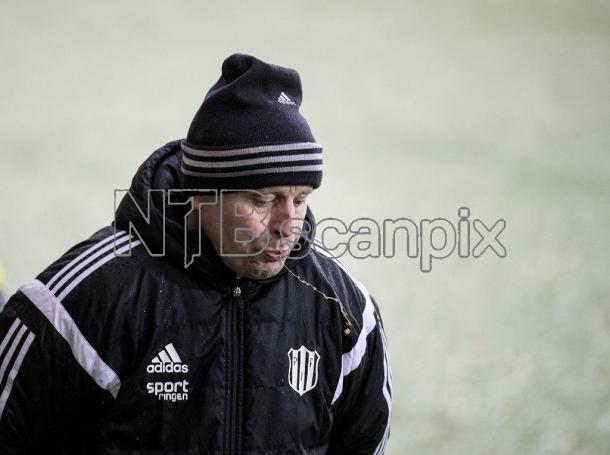
Nick Cushing – Manchester City
It took 32 year-old Nick Cushing just three years at the newly rebranded Manchester City to steer the club to their first WSL title. In what was arguably a sub-standard season for their fellow WSL 1 teams, City barely put a foot wrong all season, maybe not reaching their best either; what City did they did right.
Having pushed eventual winners, Chelsea, every step of the way during the second-half of the 2015 season, 2016 was the year the Citizens were tipped for big things. An extra-time loss away to Chelsea in the FA Cup semi-final the only defeat suffered by the Manchester side all year, three draws during the season their only points dropped, City had their eyes firmly on the prize. A second league cup win the icing on top of a league season they’d run away with, Cushing thoroughly deserving of the plaudits.
One of the teams in England that can be an absolute pleasure to watch, Cushing’s playing style is evident on the pitch, from City’s possession-based game to their guile and ease with the ball, a real team ethic running through the champions. A strong identity and core of players vital to them in 2016 as Cushing continued to cut the fat from his squad prior to the start of the season.
Even if someone were to overlook City’s domestic achievements this year there is little that can be written off about their sterling form in the UEFA Women’s Champions League. Debutants in the competition, City were dealt a slice of luck avoiding the “bigger” teams like OL and WOB but still had to navigate a tricky tie against experienced Russian side Zvezda Perm.
Although most of the City squad had a degree of experience in Europe, playing in the UWCL an entirely new concept for Cushing, not use to teams happy to sit and carry a 1-0 loss with them into a home-leg. Preparation key for City as they eased through the away leg in Russia, once again fortunate to avoid a highly seeded team in the Round of 16. Brøndby proved to be tougher competition but once again, City found a way past the stubborn Danes, the team and manager learning every time they took to the pitch
John Herdman – Canada
Following on from an underwhelming showing at the 2015 World Cup which they were hosting, John Herdman’s Canada bounced back well this year. The Canucks hit the ground running in February, easily disposing Trinidad and Tobago, Guyana and Guatemala in the group stages of the CONCACAF mini tournament for Olympic qualification. A confident showing against Costa Rica followed ensuring a spot in Brazil before a final loss to the USWNT relegated them to silver for the mini-tournament, the bigger goal accomplished.
Canada carried their sterling form with them through the Algarve Cup the following month, suffering just one loss to Denmark en route to their first ever Algarve win, besting Brazil in the final. A Seleção handed them their third loss of the year next time the two met in June, a loss to France followed in July before the Olympic tournament got underway.
Looking calm and confident during their stay in Brazil, Herdman’s Canucks were the surprise package of the tournament and would have been bursting with confidence going into their semi-final against a German team they beat in the group stages but the plucky team from North America came unstuck against the eventual champions and they had to settle to a bronze medal match. Looking much the better set-up team, Canada retained the composure that they had been lacking the previous summer as they stayed focused in a less than friendly environment at the Arena Corinthians in São Paulo to claim their second Olympic silver.
It’s been a year to remember for Canada and coach Herdman is a vital component to their success, balancing experience and youth across his team, unafraid to cap younger up and coming stars. The likes of defenders Kadeisha Buchanan, Ashley Lawrence as well as teenage midfield duo Deanne Rose and Jessie Fleming have blossomed in the senior team with full backing of their coach. In the same token, stalwarts of the team, Christine Sinclair, Melissa Tancredi and Diana Matheson have remained a crucial part of the Canada set-up, the balance just right for the Reds.
Embed from Getty Images
Pedro Lopez – Spain U19 + U20
Having steered the Spain Under-19 team to their third successive silver medal at a European Championship during July, Pedro López then lead the Spanish Under-20 team to a respectable quarter-final placing at the U20 Women’s World Cup in Papua New Guinea at the tail end of the year.
With a growing league and increasingly promising results with the senior team as well as a number of high-profile internationals, Spanish football is one of the places to be for women’s football, the youth teams coming through inspiring even more confidence in La Roja. Still a long way behind the men’s national team but catching up all the time.
One of the delights of the Summer U19 Euros in Slovakia was López’ Spain, his young team bursting at the seams with confidence and skill, a healthy attacking threat helping to propel them through the competition. A tight win against regular favourites, Germany, got their tournament off to a flying start before drubbings of Austria and a hard to pin down Switzerland saw them finish top of their group and set up a show down with the Netherlands in the semi-finals.
The match was a slow-burner but La Roja twice came from behind to scoop the win and book a spot in the finals against the eventual winners, France. Although the Spanish side would have wanted to the gold, a fifth silver placing at the tournament was little to be sniffed at.
Bringing 12 of the 18 players he capped for the U19 Euros with him to Oceania, López set about once again getting the best out of his predominately young squad. Once more López’ squad hit the ground running, registering a hearty 5-0 win over Canada before a clinching all three points against group-favourites Japan, a surprise 2-1 loss to Nigeria pushing them down to second in the group. As runners-up, La Roja had drawn the short end of the straw and came up against eventual winners, North Korea in the quarter-finals, again López’ side put up a strong fight but were undone in extra time.
With two very strong showings in two very different environments with the same core players at two different age levels, López has shown a delicate understanding of both the U19 and U20 teams, instilling healthy confidence and belief in the young sides who’ve grown under his tutelage.
Silvia Neid – Germany
Having slipped through the 2015 World Cup without so much as a bronze medal, Silvia Neid would have been looking to go out with a bang after over a decade with the team. Three successive bronze medals at Olympic tournaments (from 2000-2008) Germany’s best record with the games, an Olympic final still tantalisingly out of reach for Die Nationalmannschaft prior to 2016.
The 2015 World Cup had started to highlight cracks in the German armour, but having cruised through Euro 2017 qualifying it was hard to see the problems as the eight-time European Champions made light work of qualifying for their tenth Euro tournament. A 2-1 loss to the USWNT in March did little to ease fears that the squad wasn’t firing on all cylinders as Germany flattered to deceive at the SheBelieves Cup and a draw and loss in the group stages at the Olympics stirred Die Nationalmannschaft into action.
Refusing to give up fighting, the team looked renewed as they found their way past China and a Canada team who’d handed them their second loss of the year to make it to the Olympic final. Up against a steely Sweden team who’d had their own stories to tell about their time in Brazil, Germany could have wobbled but unlike the other sides Sweden had faced the Mannschaft found a way through.
The Olympic final a fantastic clash on the pitch as two experienced coaches battled out on the sidelines, Neid’s Germany just too much for Sundhage’s Sweden who had still managed to create their own history.
Olympic gold the missing piece of the puzzle for a Germany team who had won it all, their long wait for Olympic glory over as one of their most beloved players coached them to history. Neid’s last match the one to complete her personal hat-trick of leading her country [from the dug-out] to World Cup, Euro and Olympic gold.
Paul Riley – Western New York Flash
With Mark Parsons’ Portland Thorns storming the regular season it could be of surprise to many that he’s not the NWSL manager we’re praising here – although little could disagree that the former Chelsea boss had a brilliant season in Oregon.
However, unlike his English counterpart, Paul Riley didn’t have a stacked squad, where the Thorns boasted USWNT international stars like Tobin Heath, Lindsey Horan and Meghan Kingenberg as well as Canadian goal-getter Christine Sinclair and European internationals Nadia Nadim, Dagný Brynjarsdóttir and Amandine Henry, the Flash had a far more humble squad.
With draft picks like Michaela Hahn, Makenzy Doniak and Mallory Weber, Riley was building a solid squad but not one that would necessarily light up pitches across the country. After a slow start to the year with both coach and new players customising themselves to their new surroundings, the Flash began to rapidly pick up momentum, Lynn Williams and Jess McDonald finding a partnership up top with Sam Mewis starring in midfield, the team found its’ feet and began to shift up the table.
With other NWSL teams leaning on their USWNT players, the Flash were one of the few unaffected by training camps and international windows, Williams and McDonald happy to terrorise defenced from East to West.
Throughout it all Riley remained a key component in the team’s success, the coach a core component as the Flash saw off Shield-winners, the Thorns in extra time in the Championship semi-final before besting Washington Spirit on penalties in the final. The mini-tournament of the Championship a true test of mettle, the team bound together by their coach.
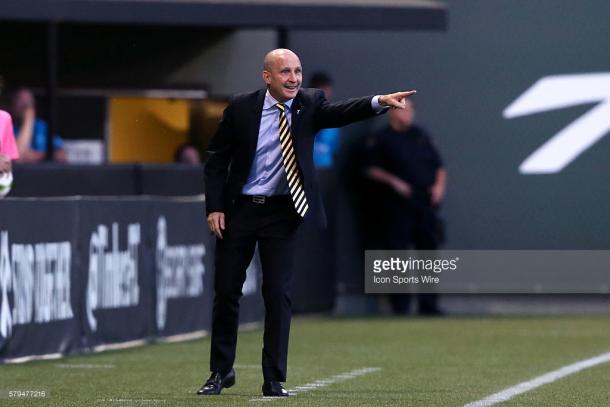
Martin Sjögren – Linköping
In his fifth season with the club, two-time Damallsvenskan winner Martin Sjögren guided Linköping to their second ever Swedish title. Having made steady improvements during his time south west of Stockholm the former Rosengård (then LdB Malmö) manager finally hit upon the golden formula for league success with LFC.
Utilising a perilously thin squad, Sjögren moulded his title winning squad around a handful of players, others more feature players or brought in to cover for injured players and asked his team to bring their very best to the pitch.
Whilst Stina Blackstenius and Pernille Harder stole the headlines with their respective goal glut(s) – as well as racking up the assists too – it’s hard to look past the work put in by the likes of Cláudia Neto and Mariann Gajhede in midfield, Jessica Samuelsson and Magdalena Eriksson in defence and 23 year-old Casja Andersson in goal (as well as Janni Arnth, Joanna Andersson, Kristie Minde, Emma Lennartsson, Renee Slegers, Tove Almqvist, Emilia Larsson and Fridolina Rolfö – and all should really be mentioned).
Sjögren didn’t just tell Blackstenius and Harder to go out and score goals but shaped his team around their attacking threat, everyone involved played their part and their unbeaten season and title success wouldn’t have been possible without that team ethic and everyone knowing exactly what their manager wanted from them.
The Damallsvenskan season is long and challenging, no game is a sure thing and it is no mean feat for a team – any team – to go the entire course unbeaten, and whilst another manager may have guided Linköping to the title it’s hard to imagine anyone else having done so as stylishly and confidently as Sjögren.
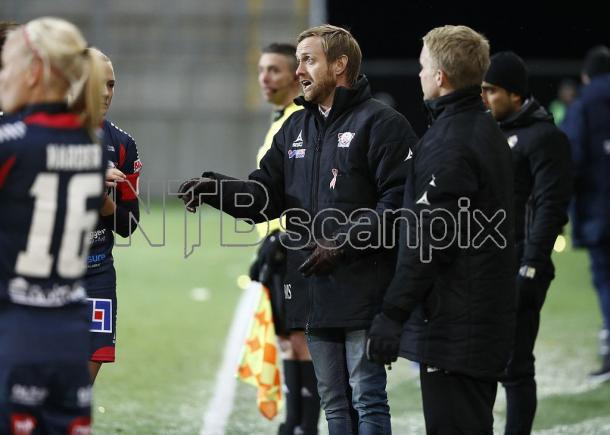
Brian Sørensen – Fortuna Hjørring
Locked in perpetual battle with southern rivals Brøndby, Fortuna Hjørring once again climbed to the top of the 3F Liga tree during the 2015-16 season, finishing three points better off than Pigerne Fra Vestegnen, serving the southerners their only defeat of the season. Coming out the team on top after ten play-off games to confirm themselves as the best in Denmark.
During the 2016-17 season it’s once again been all about Fortuna and Brøndby, the Northerners second best to their southern counterparts, their only loss of the year coming on the last day of the regular season as they fell to a 2-1 defeat. With the Championship round not due to kick off until April there’s still plenty of time for Sørensen’s Hjørring to come out on top.
Before then, however, is the small matter of a UEFA Women’s Champions League quarter final tie. Near faultless in the league and a tricky opponent in Europe, the team from northern Denmark have made themselves a thorn in the side of all they face as they hunt for seldom tasted Euro glory. Having navigated their way through to the last sixteen for the eight season in a row, Fortuna have out-done themselves this time around, reaching the quarter-finals after a superb showing at home to Brescia after a tight 1-0 win in Italy.
Sørensen’s team have proven themselves worthy opposition, a multinational group that marry together well on the pitch, the coach’s input crucial in their development and progression in all competitions.
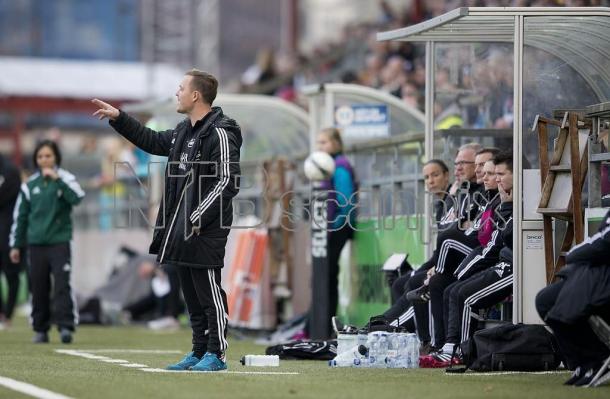
Pia Sundhage – Sweden
Love her or hate her, Pia Sundhage knows how to win silverware, her defensive style of play not as attractive as its’ open and attacking opposite but when managed (and coached) properly it’s a defensive masterclass. Well decorated as a player, Sundhage is remembered as a goal-getter, top goalscorer in the first two years of the Damallsvenskan (1982, 1983), her goals vastly important for Jitex BK whom she helped to four titles over ten years.
As a coach however, Sundhage favours more of a conservative style. After a disappointing 2015 World Cup, Sweden booked their spot at Rio by virtue of an equally contested mini tournament for the next four UEFA teams down from Germany, France and England at the World Cup. It wasn’t vintage but Sweden were getting the job done, a narrow win over South Africa preceded a 5-1 drubbing by hosts Brazil during the group stages. Having been humbled at the Estádio Olímpico João Havelange in front of 43, 384 boisterous Brazilians things changed quickly for the team that had always struggled at the Olympic games.
Sundhage opted to lean on her defence more, tasking midfielders with sitting deeper and asking the likes of Lotta Schelin and Stina Blackstenius to counter and push against the defence whenever they could. Schelin muted but more than willing to work and run for the cause, a theme in the team that easily fell into formation and absorbed wave after wave from their opposition. Blågult taking everything in stride, a team with a clear identity, Sundhage was the one behind their progression, having instilled the team ethic in her side.
It may not have been the most adventurous tragedy but it was fruitful, keeping China out for ninety minutes before forcing the USA to penalties after conceding just one fifteen minutes from time. Another clean sheet followed against the same Brazilian team that had stuck five past them ten days prior, the revitalised team finally undone by Germany in the final but their first ever Olympic medal and a new chapter in their history a literal silver lining to the loss.
Kenneth Zseremeta – Venezuela U17
With 17-year-old dynamo Deyna Castellanos the focal point for the Venezuela youth teams it’s easy to overlook the work put in not just by her teammates but her coach, Kenneth Zseremeta. A long-standing fixture with the team, Zseremeta was there as the U17’s stormed qualification for the U17 2014 World Cup with a convincing tournament win at the U17 Campeonato Sudamericano Femenino, an even younger Castellanos playing a starring role. The win saw them through to the 2014 edition of the U17 World Cup, a healthy fourth place finish.
Another rousing edition of the Campeonato Sudamericano Femenino followed earlier this year, Castellanos the leading lady and Zseremeta the seasoned conductor, making sure the young squad functioned as one. Once more Zseremeta had high hopes for his U17 team, a man with total faith in the ability of his players and an honest love for his job, he helped to steer them through the group stage. A first day loss to an experienced Germany team taken in stride as they came back stronger to best Cameroon in highly dramatic fashion before confirming their spot in the next round with a confident win over Canada. Zseremeta pulling the strings all the way through.
Castellanos lively as ever in front of goal, her contribution to the fledgling nation huge as The Powerpuff Girls came from behind to hit Mexico for two inside of five minutes and secure their spot in the semi-finals. Although with their chances, Venezuela failed to overcome the might of eventual winners, North Korea and were consigned to a second successive third-place final and a consecutive fourth place finish.
A real driving force behind the team, the real job for Zseremeta will be bringing the squad together in the future, without Castellanos, but a man fully committed to the team as well as his country, his passion for his work shines through his players on the pitch.








































